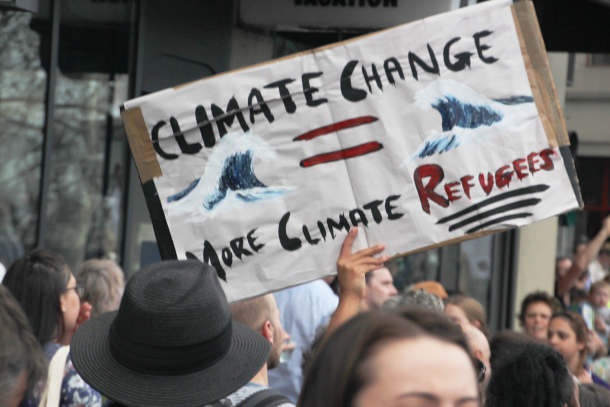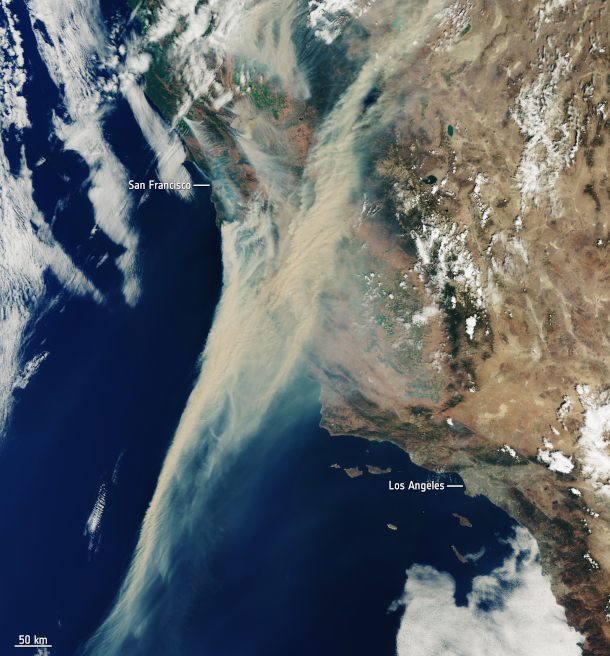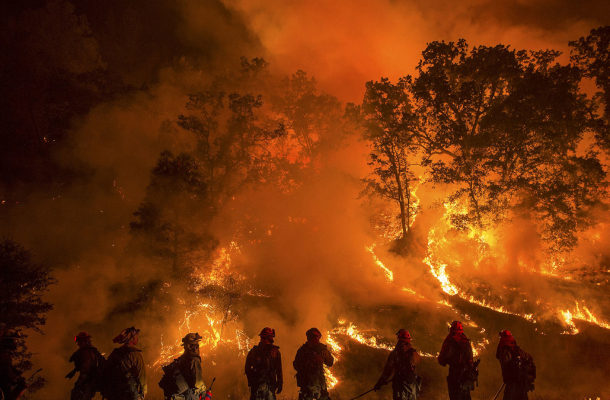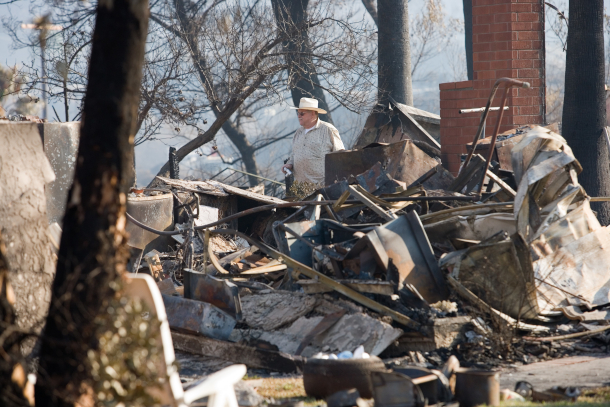Uprooted By Climate
Air Date: Week of September 13, 2024

In September 2019 over 100,000 people participated in a climate strike in Melbourne, Australia. (Photo: Takver from Australia, Wikimedia Commons, CC BY-SA 2.0)
The relentless heating of the Earth is prompting people to move after climate-related catastrophes and amid more gradual changes. Journalist Abrahm Lustgarten is the author of On the Move: The Overheating Earth and the Uprooting of America, and he talks with Host Steve Curwood about the northward migration he anticipates as Americans seek to escape punishing heat, fire, and drought.
Transcript
O’NEILL: It’s Living on Earth, I’m Aynsley O'Neill.
CURWOOD: And I’m Steve Curwood.
People can be uprooted in the wake of disasters such as wildfires, floods, storms and crop loss linked to climate disruption. But the relentless heating of the Earth is prompting some people to move even if they have not been caught in the crosshairs of a climate-related catastrophe. Journalist Abrahm Lustgarten has written a book about how life in the United States as we know it will become unfeasible as temperatures rise, which he says will accelerate an internal migration trend which has already begun. His book is called On the Move: The Overheating Earth and the Uprooting of America, and he joins me now from his home in the Bay Area of California. Welcome back, Abrahm.
LUSTGARTEN: Thanks for having me. Good to be here.
CURWOOD: Great to have you back. Why write this book?
LUSTGARTEN: Well, the book arose out of a series of articles that I wrote in 2020 for ProPublica and the New York Times Magazine that looked at how climate change was going to displace people and how it would lead to a new era of what I think will be mass migration in the future in general. And you can slice that a million different ways, many of which are important. But one thing that came up through that reporting was the fact that climate change was going to displace Americans as well, and it was going to displace potentially myself. And in the course of reporting, I was I live in California, and I was really confronted by a disastrous set of wildfire seasons, and it really got me thinking. At the same time that I was doing this reporting and writing these articles about how climate change was going to affect my life, how it might affect Americans' lives, and why we're relatively privileged and sheltered from climate impacts compared to so many other parts of the world. Change is coming nonetheless, and I became really intently focused and curious on what that change was going to look like for the United States.
CURWOOD: In your very thorough style, Abrahm, you have drilled into many, many aspects of what the increasing displacement due to climate disruption, that impact that it's going to have on us. But let me ask you another kind of broad question, and not a simple one. Who is a climate migrant?
LUSTGARTEN: Yeah, you know, everybody's got a different definition for this, and I tend to take the broadest and most flexible definition. So to me, a climate migrant is somebody whose decision to move or whose displacement has in some tangential way, been influenced by the change in our environment and by the pressures of climate change. And, you know, people have always moved, migrated for reasons around conflict, persecution, economic opportunity. I think those are kind of the standard explanations for the factors that drive migration. And I've been really interested in how environmental change plays into that. And moving away from this cliche idea that a climate migrant is only somebody who's been displaced by environmental change alone. And so I'd like to look at a set of more complex and nuanced factors, the way that environmental change might put somebody in a situation where conflict then displaces them. So I think very broadly about it, and if environmental change has any role in moving a person out of their homeland and into a new location. I consider them a climate migrant.

A Sentinel-3 satellite image from August 19th, 2020 shows widespread smoke from California wildfires. Extreme heat, winds, and storms fueled dangerous conditions, forcing evacuations near the San Francisco Bay Area. (Photo: Copernicus Sentinel image, Wikimedia Commons, processed by ESA, CC BY-SA IGO 3.0)
CURWOOD: That's right. I mean, people move, as you say, for a number of reasons, economics, opportunity, conflict. So to what extent do you think that climate becomes that proverbial straw on the camel's back for many people?
LUSTGARTEN: Yeah. I mean, I think it absolutely is, and I think that that makes it hard to identify or to single out for many people as well. I, for example, spoke with, spent some time with a woman in San Salvador who was victim of gang violence there and was looking to move to the United States. And so she would be typically described as a person persecuted under difficult gang situations, but she would prefer to move back to her hometown. But her hometown, this small village in the mountains in El Salvador, was suffering from a coffee fungus that was driven by climate change. So I describe her as an environmental migrant, as a climate migrant, and the same way that somebody in California might move because their homeowner's insurance becomes too expensive because of the wildfires. They don't necessarily connect that idea with their fleeing wildfires, but they are ultimately driven to move because of that environmental change. And in those ways that environmental change, it can have an enormous effect, and it can literally displace people, like flooding in Houston, or it can have a very, very subtle, almost immeasurable effect that you know that proverbial straw on the camel's back that is almost unidentifiable, but does tip the scales in driving somebody to change their circumstances or change their location.
CURWOOD: So talk to me about the most climate risky places these days in the United States.
LUSTGARTEN: It's probably no great surprise, but the riskiest parts of the country are along the south, throughout the south, from the southwest all the way to the southeastern coast and the west coast. I based my reporting off of collection of empirical data modeled by the Rhodium Group. And we modeled very specific risks, risks like threat of wildfire, threat of drought, decline in crop yields, rising temperatures, economic harm, rising sea levels and those things. And if you map all of those, which I did, you see that many of them overlap. And what they essentially tell you is that the southern third of the country is significantly more at risk than the northern two thirds of the United States. To grossly overgeneralize, but that is kind of the trend. And so the projected or assumed. You know, reaction to that is that as people begin to move, to migrate because of these changes, that they will migrate from those regions northward.
The complex, contradictory and heartbreaking process of American climate migration is underway “At first, after the storm, it’s volunteers pulling out trash... Then, it’s not destruction, but the aftermath of destruction.” An excerpt from On The Move. https://t.co/lpP72TsTeZ
— Abrahm Lustgarten (@AbrahmL) April 11, 2024
CURWOOD: Abrahm, to what extent did you find that government policies in the US have deceived us about the risks of climate disruption?
LUSTGARTEN: You know, it's very hard to link cause and effect with certainty, but I looked closely at a number of disincentives that have arisen through American policy of one sort or another that have tended to encourage people to live in the path of great risk, and one of those that I focus on in the book is the role of homeowners insurance and property insurance, and we're having such a great conversation now nationally about insurance in the face of climate change, because it's becoming more expensive and is becoming harder to get. But for many, many years, insurance was used as a tool to make it seem safe to live in the path of disaster, and it was subsidized by states across the country to reverse or protect against the actual risk of out migration, of declining population. So in the book, I explore, for example, how after Hurricane Andrew in 1992 in Florida devastated parts of that state. And Florida was in an economic recession at the time, and its population began to move. And so the state, in an effort to keep people there created its own state run, state subsidized insurance plan. Called it a fair plan, called it Florida citizens eventually, and that plan promised that insurance would be available to everybody at a cheaper cost than they were already paying, no matter their circumstances. And that kind of system has now been replicated across 30 odd states. It's being used in California now to provide insurance to people who are at risk of wildfires, for example. And it has an effect of blunting the effects of climate change, because it blinds homeowners to the risks to their assets. It makes it seem safer, makes it seem easier to protect the value of their homes when they're in the path of risk than it actually is. And so that's one kind of mechanism that has disincentivized a logical response to environmental change.
CURWOOD: So in the United States, what does wealth have to do with climate risk?
LUSTGARTEN: Well, probably no surprise, but the wealth equals capacity to be resilient in the face of impact, and so it affects climate driven migration in a whole bunch of ways. But it also affects just our individual ability to protect ourselves or to rebuild in the face of disaster. So from a migration standpoint, the experts I talk to and the models kind of pinpoint a middle class as the most likely to move in response to climate change, because you need to have some degree of wealth to be mobile. But those with extraordinary wealth are also more likely to kind of have backup plans, maybe multiple homes, keep a farm in Vermont while living in Phoenix, Arizona, or something like that. So you know, the wealthy have greater flexibility to make dramatic changes at the last moment, and don't have to plan for them as much. And at the other end of the spectrum, you have the impoverished, but also just unwealthy parts of the country, and that's a whole other part of the story. I mean, we will have communities in the United States, as we will around the world, who are trapped by the circumstances of their changing climate and cannot migrate for a number of reasons, one of them being economic. And that's going to be a growing part of the climate change story, of the social story around climate change, and it's already been a part of the inequities of how climate change has affected American communities and affected communities across the country, where lower income communities and many minority communities have already borne a very disproportionate brunt of the environmental changes we've seen so far. We can expect that to happen in the future, and then we can expect those same segments of our population to be less mobile and a little less resilient to the opportunities to to migrate in response to it in the future.
CURWOOD: Little hard to move when you're on a fixed income, say, from Social Security or something and everything's balanced out where you live today to think about moving to someplace else tomorrow;
LUSTGARTEN: That's exactly right.
CURWOOD: Not to mention giving up your friends and community.
LUSTGARTEN: So friends and community are, you know, a real intangible part of this conversation and a real draw factor to keep people from moving as is age. So when we start to think about trapped communities, it's that intersection of poverty, perhaps of age, of deep communities, of small communities, that makes it both painful and less and less practical to be able to respond by changing your location.
CURWOOD: Now what about relative wealth internationally, what does that have to do with climate risk? United States is fairly affluent. A lot of the rest of the world is not.

A wildfire engulfs a hillside by Highway 29 in Lower Lake, CA on Sept 13, 2015. The fast-moving Valley Fire devastated Middletown and surrounding areas, burning numerous homes and displacing thousands of residents, according to officials. (Photo: Jeff Head, Flickr, Public Domain)
LUSTGARTEN: Yeah I mean, I started the conversation by just kind of offering that caveat, that we are relatively privileged and relatively sheltered, though not immune from impact and change. And so globally, almost everybody is worse off than we are. Is the simplest way to see it. We have the most vulnerable nations in the world also are largely to generalize, you know, the most populated and they are also the most impoverished. And so from both a climate change perspective and a climate migration perspective, the hot spots of enormous risk are the equatorial regions around North Africa, South Asia, Central America. Many countries in which are among the poorest in the world and among the most populous. And it means that they have the least flexibility and the least amount of depth of resilience to adapt to these changes, and that they're also, you know, the most likely to have their populations migrate in search of better circumstances, and so the relative wealth of nations around the world means that the most populous parts of the world are going to be the hardest hit and the most likely to move but it also suggests that there's a great responsibility on the part of the wealthy parts of the world to stabilize the communities around them, maybe to make up for the damages that they're seeing and experiencing and will experience, and it gets really quickly into the loss and damage conversation about who's responsible for emissions that have caused climate change and who's responsible for mitigating the long term effects. And the climate migration conversation just really underscores the importance of that larger conversation about equity and debt, and what we as a wealthy nation owe to those other parts of the world that are going to be even harder hit.
CURWOOD: And now, what about Abram Lustgarten, who lives in the Bay area of California, you write in the book there were days just choking with the wildfire smoke. Doing the work that you've done these years, knowing that this is no joke: Climate disruption is for real. What's your decision?
LUSTGARTEN: My decision hasn't been made yet. Through the course of my experience in my reporting, it's given me a great appreciation for the complexity of migration and the complexity of making a decision about whether to move. It's forced me to reflect on why I live, where I live, and how I make that choice, so it's not a naive or a blind choice, and it's affected by so many other factors, like the fact that we have not had the kind of disastrous wildfire season that we had in 2017 2018 2019 2020 at the time, I began writing and began considering being forced to move myself. It seemed like we were on a linear trajectory towards an apocalypse, basically. And that's one context in which to make a decision, you know, about my own life. But the calmness that has followed those for a couple years, which I know empirically and objectively, is temporary. I mean, I see the data, I know what the climate risks are for the part of Northern California that I live in, and the long term story is not a positive one, but the short term story is a period of relief.

In this October 28, 2007 photo a group of friends assist one another in sifting through the ruins of a home in Rancho Bernardo, California, in the San Diego area. Photo: National Archives at College Park, Wikimedia Commons, public domain)
CURWOOD: So Abrahm, you're a reporter who's looked at climate disruption, but it's also moving you into being a philosopher about the way civilizations and societies function with this tsunami of climate disruption coming at us from your view. How are we set to deal with this as a society, both here in America and around the world?
LUSTGARTEN: Brittleness is a word that comes up a lot, both among the experts that I talk to, and I think it reflects my current feeling. There are bright spots in Americans' ability, I think, to adapt to the changes that are coming. There are organizations and communities and groups of political movements that are well poised to greet the change in a proactive way, prepare for it in ways that will lessen the blow, if you will. But I'm sorry to say that I'm a little more cynical about the larger average impact, and I think we see incredible political divisions in this country, and political divisions that are kind of replicated in countries around the world at this moment. I don't see those political divisions as being altogether separate from climate influences. I think that the way that these issues interact isn't totally clear yet, but the pressures of a changing climate, the pressures that it puts on migration and on border, policies of our country and on other countries, I think, is an unrecognized pressure. The cost of climate change, I think is a pressure on our fiscal health and on all the policies that result from it. And I don't think that I see, you know, a level of cooperation or preparedness or willingness to invest financially, or willingness to invest socially, quickly enough and at a scale enough that will really prepare us nationally for the changes that are coming. And so, you know, I think it's going to be a difficult era of successes surrounded by larger challenges.
CURWOOD: Abrahm's Lustgarten's book is called "On the Move: The overheating Earth and the uprooting of America. Thanks so much for taking the time with me today.
LUSTGARTEN: Thanks for having me on.
Links
Living on Earth wants to hear from you!
Living on Earth
62 Calef Highway, Suite 212
Lee, NH 03861
Telephone: 617-287-4121
E-mail: comments@loe.org
Newsletter [Click here]
Donate to Living on Earth!
Living on Earth is an independent media program and relies entirely on contributions from listeners and institutions supporting public service. Please donate now to preserve an independent environmental voice.
NewsletterLiving on Earth offers a weekly delivery of the show's rundown to your mailbox. Sign up for our newsletter today!
 Sailors For The Sea: Be the change you want to sea.
Sailors For The Sea: Be the change you want to sea.
 The Grantham Foundation for the Protection of the Environment: Committed to protecting and improving the health of the global environment.
The Grantham Foundation for the Protection of the Environment: Committed to protecting and improving the health of the global environment.
 Contribute to Living on Earth and receive, as our gift to you, an archival print of one of Mark Seth Lender's extraordinary wildlife photographs. Follow the link to see Mark's current collection of photographs.
Contribute to Living on Earth and receive, as our gift to you, an archival print of one of Mark Seth Lender's extraordinary wildlife photographs. Follow the link to see Mark's current collection of photographs.
 Buy a signed copy of Mark Seth Lender's book Smeagull the Seagull & support Living on Earth
Buy a signed copy of Mark Seth Lender's book Smeagull the Seagull & support Living on Earth

